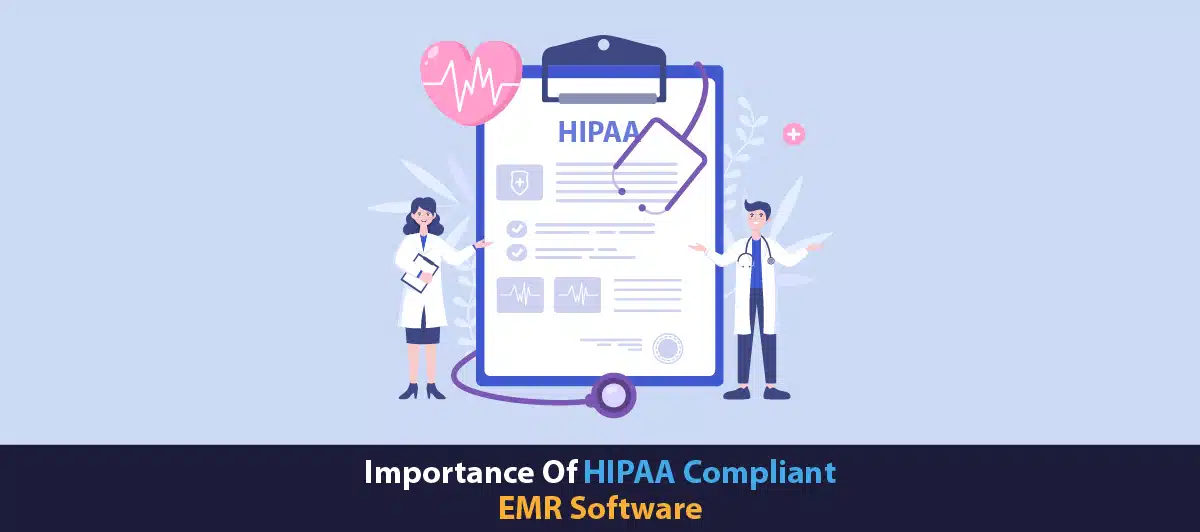Why HIPAA Compliant EMR Software Is Mandatory For Hospitals
Quick Summary: The HIPAA Compliant EMR Software is the necessity of every hospital. HIPAA health insurance portability and accountability act. It is a legal rule in the USA and the following rules provide the guidelines for proper handling of sensitive medical information. Its use is necessary for protected health information and for various reasons. We will discuss it all in this blog! Keep reading!
Introduction
The Adoption of HIPAA compliant EMR has become inevitable for the hospitals. It provides protection of patient’s sensitive health information. HIPAA, short for the Health Insurance Portability and Accountability Act, features strict rules when it comes to protecting records of patients. Every hospital, clinic and health facility has to adhere to the HIPAA regulations to avert expensive penalties and litigation costs.
EMR software helps hospital management to organize records electronically and in a very efficient way. However, getting around this aspect means that one has to consider the HIPAA regulations in this process. Electronic medical record (EMR) solutions that follow HIPAA standards feature stringent data security policies including encryption, access control, and trailing.
Additionally, as cyber threats are rapidly growing and data breaches are becoming more and more frequent, hospitals cannot afford to ignore HIPAA compliance. These are just a few reasons, we will explore more reasons why you need Best EMR Software with HIPAA compliance.
Read More!
What is HIPAA Compliant EMR Software?
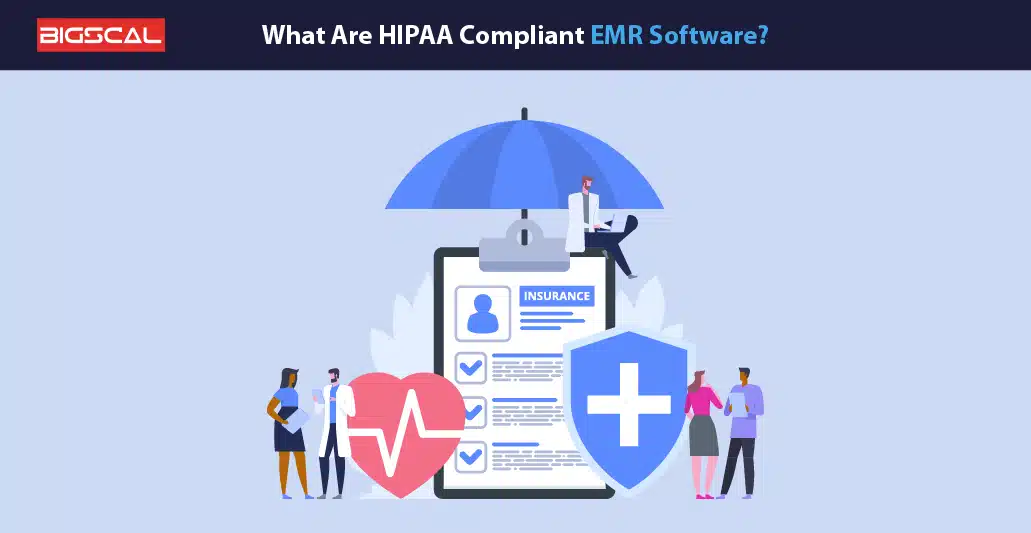
HIPAA compliant EMR (Electronic Medical Record) software defines a type of electronic medical records software. This electronic form or software corresponds to the general requirements established by the Health Insurance Portability and Accountability Act (HIPAA). It is a health care law in the USA which is aim to protect the privacy of patient health information from disclosure to unauthorized parties. A medical management record systems application stores and manages complete and accurate patient’s charts in the form of electronic records instead of paper bases.
HIPAA has several requirements on the securities and privacies of the health information technology for an EMR/EHR Software to qualify as HIPAA compliant. This comprises data encryption, user authentication procedure, whereby it monitors the frequency of using data with access logs, and checks how the data is transmits. Moreover, the effective implementation of EMR software will allow patients’ data to be accessible only to juridical persons and patients themselves and safeguard the data from leakage or cyber attacks in compliance with the HIPAA requirements.
Key Features To Look For In Electronic Medical Records HIPAA Compliant
Here’s the list of key features that doctors must check into the EMR system:
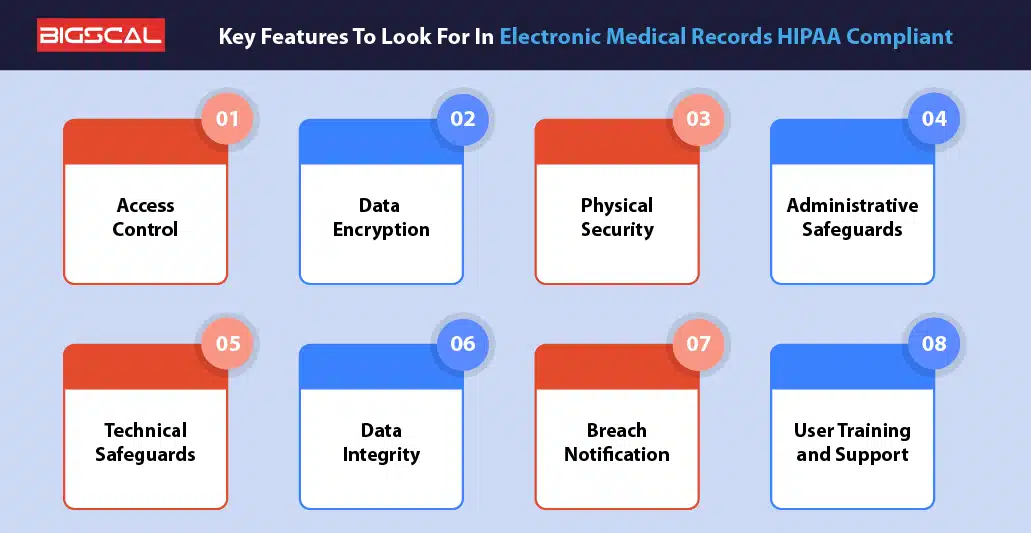
Access Control
EMR compliance with HIPAA implements health records and access control. It means the measures employed to restrict the access of the patient data to authorized personnel only. This accomplishes features such as requiring users to have separate login IDs and using thoroughly with passwords. And one is accessible information relevant to their work only.
For instance, through the EMR, a nurse attending to a particular patient may view records of that patient’s treatment, while a billing clerk may only view records of payments made.
Data Encryption
Data encryption feature means translating electronic medical data into a form that is easily understandable only to the individual who has access to the decryption key. This helps in that even if the information is received by illegal individuals, they will not be able to comprehend it.
There are two types of encryption: Transmission security, which ensures data security as they are transfer from one device or network to another, and storage security to ensure data security as they are stored. In this way, EMRs keep patients’ health information safe from outside interference, hacking or attacks on electronic records. Hence, it ensures healthcare services.
Physical Security
EMR systems and the patient data are stored physically and other physical access security measures are important to safeguard the physical hardware and places of storage. This ranges from placing gates in the data center to employing guards, plus installing security cameras. One should ensure that these areas can only be access by personnel who qualify. In this case, assets including servers and backup devices that store in areas that shield them from unfavorable conditions like fire, flood or power losses.
Administrative Safeguards
Administrative safeguards are the rules to address the acquisition, implementation, and maintenance of the security measures of the patient information. This includes performing basic risk assessments, making certain that staff is good in HIPAA rules and security techniques. In its detail it also contains information on policies for patient data access, retention, and disposal at the administrative level.
Technical Safeguards
Technical controls are the strategies put in place to ensure the security of EMRs from outside intrusion. This includes; encryption, which makes the information difficult to understand by unauthorized personnel, and authentication, which ensures that only those who are permitted can access the information. Other measures include audit controls that track who has inifnite access to the records as well as the changes they carry out, automatic log-off that ensures the machines log out on their own if they have been left open.
Data Integrity
Maintaining data integrity means that the medical records’ content and their structure must be correct and covered entities. In the context of EMRs, this entails safeguarding patient data from being lost, changes wrongly. Some ways to keep the data accurate are data entry validation, data backup to retrieve the lost data, and versioning to control the changes. Maintaining data accuracy is paramount, as its accuracy is essential for treatment procedures, diagnosis, and keeping track of patient history.
Breach Notification
The Top EMR Software or even electronic health records system must have breach notification features for better health plans. It is a procedure of notifying the individuals when there is an unauthorized use of their personal and sensitive medical data. HIPAA mandates that healthcare providers must inform the patient to the Department of Health and Human Services (HHS) in case of any breach of patient records and security rules. This feature reduces harm, builds and retains patients’ trust, and addresses legal requirements to timely inform patients of emerging risks, empowering them to protect themselves when necessary.
Interoperability and Compliance
The Top EMR Software or even electronic health records system must have breach notification features for better health plans. It is a procedure of notifying the individuals when there is an unauthorized use of their personal and sensitive medical data. HIPAA mandates that healthcare providers must inform the patient to the Department of Health and Human Services (HHS) in case of any breach of patient records and security rules. This feature reduces harm, builds and retains patients’ trust, and addresses legal requirements to timely inform patients of emerging risks, empowering them to protect themselves when necessary.
Interoperability and Compliance
Interoperability is the capability of the various EMR systems to exchange information with individually identifiable health information. This is important in the delivery of patient care, because it means that no matter in which facility a patient has received treatment, his or her records will be available to medical professionals respectively. Compliance is about ensuring that information technology systems align with certain laws. This refers to periodic checks, changes in software and its upgrades. The upgrades that you need to meet the standard set, and the orientation of the employees.
User Training and Support
There are strategies that you need to follow to make sure that the healthcare staff utilizing the EMR systems. User training must enable the use of the software, data security measures, and breach preparedness. Maintenance is also essential as it offers customers a channel to seek help or find solutions to problems as well as keep an eye on updates, changes, and trends. Training and assistance reduce the amount that the users get it wrong, improve the performance, and provide for the legal requirements.
Potential Risks Of Using Non-HIPAA Compliant EMR Software
You must be wondering why one should use the HIPAA compliance software? And what happens if someone uses Non-HIPAA compliance software? So, here’s the consequences that they may face if they do not use electronic protected health information software:
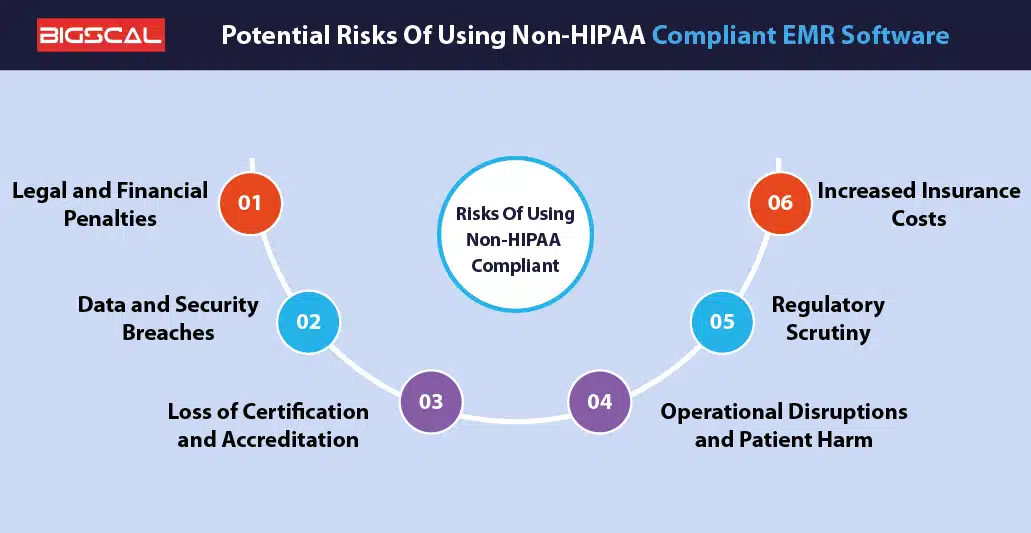
Legal and Financial Penalties
If business associates with healthcare use Non-HIPAA compliant software, they may pay a fine. The standards set by HIPAA are quite stringent as far as patient information is the concern. There are legal consequences if a healthcare organization does not, fines, litigation, and further action against them.
These penalties can range from $10,000 to $1,000,000 or more depending on the type and number of violations. Litigations and federal law suits can also drain the financial resources, could lead to bankruptcy. You can prevent these implications if a healthcare organization ensures compliance is upheld to the latter.
Data and Security Breaches
Non-HIPAA compliant software is more prone to data loss and cyber threats. One limitation is the fact that the software lacks some security features necessary to protect the data of the patients. A breach of data can lead to loss of personal, medical, and even financial information; hence, one is likely to be a victim of identity theft and fraud. The healthcare provider may incur considerable costs for rectifying the situation. This may includes; compensation to patients, inquiries and investigations, and improving security measures.
Additionally, patient’s data leakage affects the trust that patients have in the healthcare provider much longer than the actual loss of patients data.
Loss of Certification and Accreditation
Licenses and accreditation are prerequisites, healthcare providers must fulfill this. As it helps them to obtain the necessary certification. If healthcare organizations implement EMR without HIPAA compliance they may lose such credentials. HIPAA regulations must be strictly complied with by accreditation bodies and regulatory agencies are responsible for easy handling of confidential patient information. Non-compliance can lead to withdrawal of certification, meaning that the provider may risk reducing his/her operational capacity, get less funding and patients’ confidence.
Operational Disruptions and Patient Harm
EMR software that is not compliant with legal guidelines can result in major operational problems. Such endemic cases put patient data and systems at risks of cyberattack, which lock down the facility and result in lost information. These disruptions pose a threat to the process of healthcare delivery by outpatient facilities, which may negatively impact a patient’s well-being.
For instance, a system failure during a sensitive operation could slow down the delivery of care and make a patient’s condition worse. Also, in terms of cost, it takes a lot of time to rebuild lost systems and information, time that would otherwise could be devoted to attending to the patients properly.
Regulatory Scrutiny
Non-HIPAA compliant EMR software incurs the attention of the government regulatory bodies to the practice. Various regulatory bodies conduct surveillance of the delivery of health care services. As it ensures compliance with the patients’ privacy and protection of their data. Failure to do so can lead to audits, investigations and closer scrutiny – which are all time consumer and expensive. Healthcare providers may need to incur costs in correcting wrongdoing and defending themselves against charges. Thus, taking time and focus away from attending to patient needs.
Increased Insurance Costs
Providers using non-HIPAA compliant EMRs may end up paying higher insurance on their services. When setting premiums, insurers take into consideration the possibility of data breaches and compliance violation incidences. Non-compliant systems are considered to be more dangerous and hence attract high insurance costs. HIPAA violations mean that insurance may not fully cater for the costs incurred in case of a data breach, placing the provider at a financial risk.
The Necessity Of Using HIPAA Compliant EMR System
Check how HIPAA Compliant Electronic Medical Record System covered health care provider with various benefits:
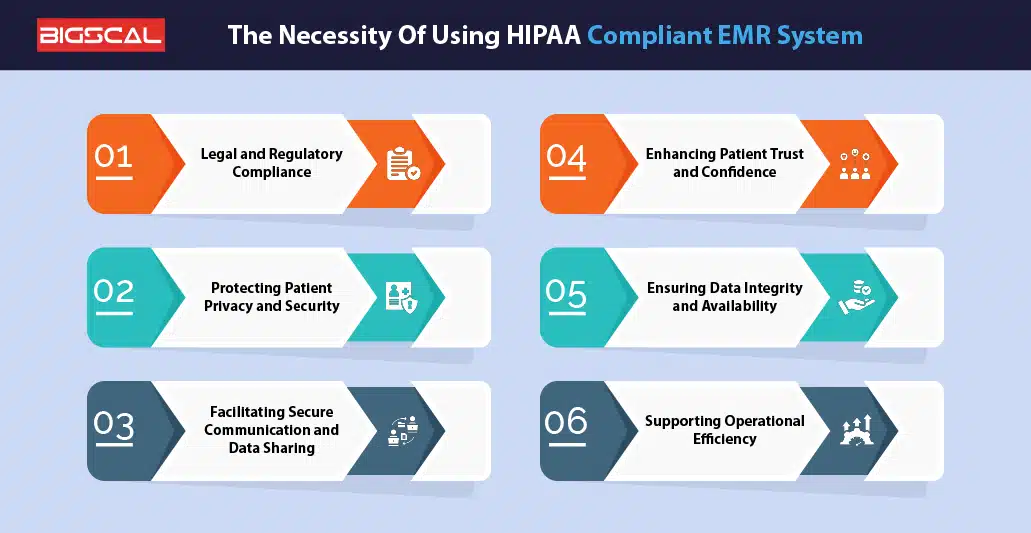
Legal and Regulatory Compliance
Implementing a legally-compliant EMR system since the adoption of the HIPAA is a legal and regulatory mandate in the healthcare industry. It establishes the requirements of protecting the patient’s information. To remain legal and to escape large fines and legal action, healthcare providers, insurers and other related entities need to adhere to these standards. It helps to provide healthcare services without hindrance.
HIPAA compliant hosting regulates how the patient information is accessed, stored, and shared based on the set policies in the organization. It reduces security risks. An EMR system that complies with these standards minimizes cases of fraud, compromises, and other violations that bring about litigations. Further, compliance is an indication of the company’s adherence to ethical standards. It also increases reputation in the healthcare industry.
Protecting Patient Privacy and Security
Privacy and security of patients are among the most valuable concerns in healthcare sector. And using HIPAA compliant hosting is necessary to address this concern. Since patients provide physicians with all their private and health information they assume that the provider of healthcare services will safeguard their information. An advantageous feature of such an EMR system is that it follows the HIPAA guidelines. Thus, guaranteeing that the trust is upheld by employing permanently effective security measures aimed at safeguarding patient information from breaches.
Such systems employ complex encryption, exhaustive login procedure, and periodic security to seal the data. This protection is vital in the world where cyber threats are becoming even more sophisticated and healthcare information is top-priority to hackers. In addition to protecting data from legal repercussions, healthcare providers ensure that patients trust them with their data to avoid experiencing a security breach.
Facilitating Secure Communication and Data Sharing
The use of a HIPAA compliant EMR system for communication and exchange of information is important in healthcare delivery today. The use of a HIPAA-compliant EMR system guarantees a protection of sensitive patient data. This implies that only relevant people, like physicians, nurses, and some clerks, have permission to access and disclose this data.
In addition, secure data sharing also promotes the relationship between healthcare providers thus improving patient outcomes. Having all the necessary patient data available to healthcare providers enables them to implement initial, interim and final decisions that are quality-based and more efficient. Such an approach enhances means to achieve better delivery of proper health care hence enhances the healthcare outcomes.
Enhancing Patient Trust and Confidence
Implementing EMR that is compliant with the HIPAA act is very important in reinforcing a patient’s faith and trust. When patients feel confident that all their details are secure and safe legal requirements, they are likely to put their faith in their chosen healthcare providers. Trust is one of the base elements of the patient-physician relationship. This is because people who have confidence in their doctors will be very free and disclose all their health issues. It leads to easy diagnosis.
Therefore, HIPAA accreditation safeguards patients’ information including their medical records, test results and other details. This trust can help patients to seek care more eagerly and reveal important information that could be concealed by them.
Ensuring Data Integrity and Availability
Preservation of data integrity and its accessibility is another benefit you get by implement of a HIPAA-compliant EMR system. Data integrity refers to the ensuring that patient information is correct in all aspects, and is consistent between records. That is, when healthcare providers employ a compliant EMR system, they can be confident that there is no alteration or tampering of the data. This is very important in order to make right health choices.
Data availability is the case where the information is available at the time of request. During an emergency, patient information is easily accessed by all personnel due to the adoption of a HIPAA-compliant system. This is important because timely and accurate information regarding the patient’s condition can be critical in managing their case.
Supporting Operational Efficiency
Implementing a HIPAA Compliant EMR Software is essential for operational support in healthcare. It is is a legislation that defines how information relating to the patient will be secured. A compliant EMR system helps to ensure that the health care providers are in a position to properly handle data in a secure way. These systems provide simplified working with patients’ records due to their digital format.
This has a helpful way of avoiding paper work which could consume so much time and be full of errors most of the time. Electronic records are readily retrievable, modifiable, and shareable among the qualified practitioners, enhancing efficiency and decreasing workload. By using Automated data entry and Structured templates and fields the probability of Human error is kept to a minimum. It results to improved diagnostic and hence treatment options will improve patient outcome.
Adapting to Technological Advances
Every organization would agree that adjustment to new technology is crucial in the present healthcare system. And having a HIPAA Compliant EMR Software is one way of fulfilling this need. With these changes in technology, the healthcare providers have the responsibility of implementing systems. Such system should improve their functions and gives method of giving privacy to patients’ information.
The EMR system must be HIPAA compliant, that is, it must have the best of the technological features to secure data. This involves issues of confidentiality such as encryption and access control, and improved system security from hacking by having frequent system updates. By adopting such a system, healthcare providers can be sure that patient data is secure from intruders and other forms of unauthorized access.
Need A HIPAA Compliant EMR? Approach Bigscal Technologies
If you need to implement an EMR with HIPAA compliance then you should approach us for it. Check how we are best in creating such software. We offer HIPAA-compliant electronic medical record solutions that are safe and effective. It keeps the patient records safe, which can help healthcare organizations feel more secure. Thus, leveraging Bigscal’s expertise allows focusing on a number of advantages. These advantages can be optimized and effective workflow, higher quality of services provided to patients, and proper data protection measures.
Additionally, we assure you of quality in terms of compliance to serve your EMR needs with the best standards. Bigscal Technologies will provide your practice HIPAA-compliant EMR system to ensure patients’ information is safe yet easy to access.
Conclusion
To sum up, the use of the HIPAA compliant EMR software is important for the hospitals. It provides the opportunity to protect the privacy as well as the security of patients’ information. This software ensures that patient’s health information is safe from access or loss by the wrong people and strengthens the patient-provider relationship. Furthermore, it ensures that hospitals do not incur expensive fines and face legal consequences due to HIPAA compliance breaches. Moreover, the focus on HIPAA is not a mere compliance with the rules, it is about protecting the patients and the overall healthcare system.
FAQ
Explain disease management program files.?
Disease management program files encompass detailed information on patients’ care plans and treatments’ effectiveness and results. These files promote the management of chronic diseases by keeping track of the patient’s medical history.
What telehealth is HIPAA compliant?
Many of the telehealth services are verify with HIPAA compliance standards And the information provided during the sessions will always be safe. Such as Zoom for Healthcare and Doxy. Both Teladoc and I ensure HIPAA standards of protection by using encryption and proper access control. Coupled with appropriate data protection measures meant to safeguard the patient’s privacy.
What is hipaa privacy rule?
The HIPAA Privacy Rule outlines guidelines for the protection of people’s medical records and PHI across the USA. It requires protections for use and disclosure of PHI. Provides patients with rights to their health information including the right of access and amendment.
What are the security threats to EHR systems?
EHR systems are threatened by cyber dangers such as:
- Ransomware attacks
- Phishing, and malware threats.
- Data losses
- Inadequate access control
List down Top EMR that is HIPAA compliant.
Healthray is one of top EMR that is compliant with HIPAA.
